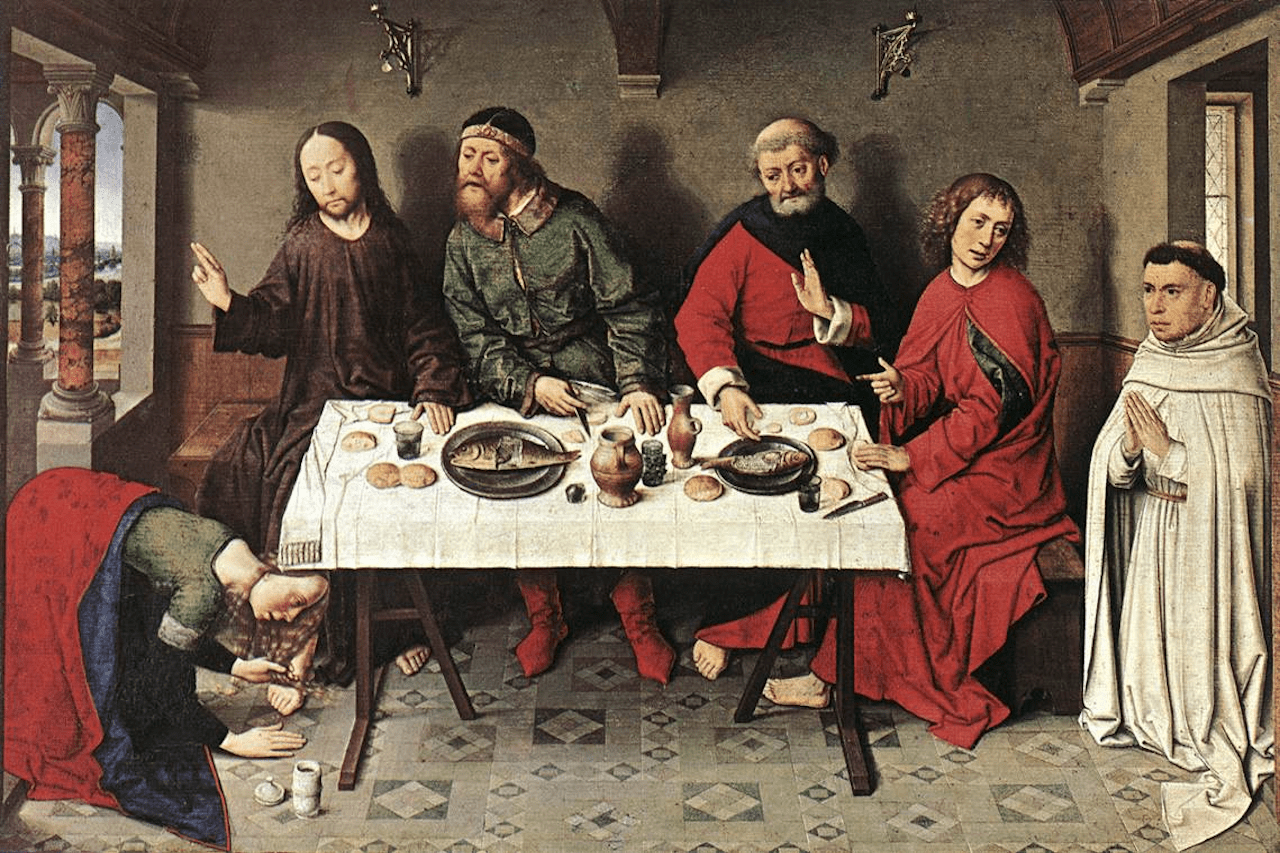Isaiah 50: 4-7 (RM) or 4-9a (RCL); Psalm 22 (RM) or 31 (RCL); Philippians 2: 6-11 (RM) or 5-11 (RCL); Mark 14:1 – 15:47.
It can feel like too much to take in at once, even though these are all familiar stories, one scenario after another, in this Passion narrative. If we see only a chain of events, we could miss the underlying meanings. Let’s draw out one story, one thread in the textile, and let it reflect light on the rest.
Yes that story, the passage telling of a woman who walked into a dinner and anointed Jesus. She is a character with no name and no voice, known to us only by one action at one crucial time; the woman of whom Jesus said,
“Leave her alone. Why do you make trouble for her? She has done a beautiful thing for me. … Truly I say to you, wherever the gospel is proclaimed to the whole world, what she has done will be told in memory of her.”
Except that it wasn’t, at least not with her name. Elisabeth Schüssler Fiorenza took this as the title of her groundbreaking 1983 book In Memory of Her, with more than a glint of irony.
This woman seems not to have been a member of the household of Simon the Leper nor a guest, however, no one objects to her presence until she breaks the expensive bottle of imported perfume and pours it over Jesus. Such an alabaster vessel would have been bottle-shaped, with a long narrow neck, and sealed such that it would need to be broken open. Perfume derived from nard would have been imported from northern India. She holds back not a drop of it.
A classic theological interpretation of her action calls it an act anticipating the imminent death and burial of Jesus, highlighted in the words spoken by Jesus in the story itself. Another interpretation names her anointing a Messianic act and contrasts her spiritual insight with the spiritual “blindness” of the scribes and Pharisees. Sometimes the interpretation goes askew by commentators claiming that Jesus affirmed it was perfectly acceptable that a proportion of the people should live in unrelieved poverty. A more credible take on these words would simply set this statement as a point of contrast with the immediate presence of Jesus among them and the unique generosity of the woman’s gift.
A few commentators tut-tut the erotic implications — this strange woman shows up and in the sight of the guests caresses Jesus’ head with massage oil, so to speak, as if she were seducing him. Others, more consistent with the call to Jesus’ followers to comfort and heal those who suffer, point to the woman’s act of comforting Jesus in advance of what she knows will be his painful death.
And then there’s the neat contrast with Judas Iscariot. The woman sacrifices a significant amount of money for Jesus, and enters the house to honour him. Judas sacrifices Jesus for the money, and leaves the house to betray him.
When contemporary postcolonial theologians sink their teeth into it, we see the larger political context. This woman who counts for nothing in the militaristic Roman Empire or in patriarchal Jewish culture literally invades the space, ignores the bullying of those who criticize the largesse of her gift and dares to anoint Jesus as prophet and ruler.
In the words of theologian Seong Hee Kim, her “act of defiance against the Roman Emperor” links Jesus’ reign, not of this earth, with his death and burial, “because his kingship against imperialism is actualized through his death on the cross.”
No
What she has done, her beautiful deed, will never be told.
Not in Tyre or Sidon, Paris, France, New York or Rome.
She will be misunderstood
her sacrifice called seduction
her prophecy rejected
her knowledge erased.
Unremarked, unremembered,
she will be found
in the negative space
wherever there is silence.*
In the silence she lives. In the silence Jesus is left for dead.
© Susan K. Roll
*Cynthia Briggs Kittredge, A Lot of the Way Trees Were Walking: Poems from the Gospel of Mark (Eugene, OR: Wipf and Stock, 2015), 69.
This is a lightly edited version of the Reflection from Palm/Passion Sunday 2021.
Susan Roll retired from the Faculty of Theology at Saint Paul University, Ottawa, in 2018, where she served as Director of the Sophia Research Centre. Her research and publications are centred in the fields of liturgy, sacraments, and feminist theology. She holds a Ph.D. from the Catholic University of Leuven (Louvain), Belgium, and has been involved with international academic societies in liturgy and theology, as well as university chaplaincy, Indigenous ministry and church reform projects.





What a wonderful weaving of possible interpretive paths – each rich in meaning – all “in memory of her”.